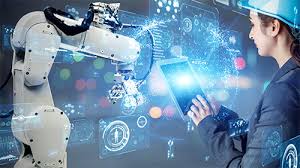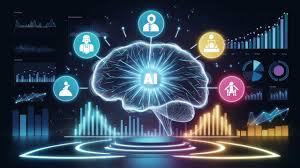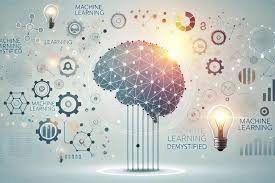Machine learning (ML) has become one of the most powerful and transformative technologies of the 21st century. From enhancing productivity to driving innovation, machine learning is revolutionizing industries across the globe. Whether it’s improving customer experiences, streamlining operations, or enabling new breakthroughs in fields like healthcare, finance, and manufacturing, the impact of machine learning is undeniable. In this article, we will explore how machine learning is transforming industries and driving innovation in diverse sectors.
What is Machine Learning?
Machine learning is a subset of artificial intelligence (AI) that focuses on building systems that can learn from data, adapt over time, and make predictions or decisions without being explicitly programmed. By analyzing patterns in vast amounts of data, machine learning algorithms enable systems to improve their performance autonomously as they process more data. This allows businesses and organizations to make data-driven decisions, automate tasks, and unlock new opportunities for innovation.
How Machine Learning is Transforming Key Industries
1. Healthcare: Revolutionizing Diagnosis and Treatment
One of the most significant ways machine learning is transforming industries is through its application in healthcare. From improving diagnostics to personalizing treatment plans, ML is making healthcare more efficient, accurate, and accessible.
- Early Detection and Diagnosis: Machine learning algorithms can analyze medical imaging, such as X-rays, MRIs, and CT scans, to identify patterns and detect diseases such as cancer, heart disease, and neurological disorders at an earlier stage. For instance, ML is being used to enhance the accuracy of breast cancer detection, reducing false positives and improving survival rates.
- Personalized Treatment: Machine learning enables the development of personalized treatment plans by analyzing patient data, including medical history, genetics, and lifestyle factors. This allows healthcare providers to recommend the most effective treatments tailored to each individual’s needs.
- Drug Discovery and Development: ML accelerates the drug discovery process by predicting which drug compounds are most likely to succeed in clinical trials. By analyzing vast amounts of biological data, machine learning algorithms can identify potential drug candidates, speeding up the development of new treatments.
2. Finance: Enhancing Security and Decision-Making
The financial industry is another sector that has been dramatically transformed by machine learning. From fraud detection to algorithmic trading, ML is revolutionizing how financial institutions operate and make decisions.
- Fraud Detection and Prevention: Machine learning algorithms are used to detect fraudulent activities by analyzing transactional data and identifying unusual patterns. This helps financial institutions proactively prevent fraud, ensuring the security of customer accounts and transactions.
- Algorithmic Trading: Machine learning is used in algorithmic trading to analyze market trends, historical data, and real-time information to make rapid, data-driven trading decisions. These algorithms can execute trades at a speed and accuracy that humans cannot match, driving higher returns for investors.
- Credit Scoring and Risk Assessment: Machine learning is enhancing credit scoring models by analyzing a broader range of data, such as social media activity, payment behavior, and transaction patterns. This allows lenders to make more accurate decisions about creditworthiness, reducing the risk of defaults.
3. Retail: Personalizing Customer Experiences
Machine learning is also having a profound impact on the retail industry. Retailers are leveraging ML to enhance customer experiences, optimize inventory, and streamline supply chains.
- Personalized Recommendations: Machine learning algorithms are used to analyze customer data, including past purchases, browsing behavior, and preferences, to provide personalized product recommendations. Platforms like Amazon and Netflix use these algorithms to suggest products and content that are likely to appeal to individual customers, driving engagement and sales.
- Dynamic Pricing: Machine learning is enabling retailers to implement dynamic pricing strategies based on demand fluctuations, competitor prices, and inventory levels. By automatically adjusting prices in real-time, retailers can maximize profits and stay competitive in the market.
- Supply Chain Optimization: Machine learning helps retailers optimize their supply chains by predicting demand, identifying inefficiencies, and recommending changes. This enables more accurate inventory management, reducing stockouts and excess inventory, and improving overall efficiency.
4. Manufacturing: Optimizing Processes and Reducing Costs
Machine learning is also transforming the manufacturing sector by enabling smarter production processes, predictive maintenance, and better quality control.
- Predictive Maintenance: ML algorithms can predict when machines or equipment are likely to fail by analyzing data from sensors and historical maintenance records. This allows manufacturers to perform maintenance before equipment breaks down, reducing downtime and repair costs.
- Process Optimization: Machine learning is used to analyze production data in real-time, identifying inefficiencies and bottlenecks in the manufacturing process. This enables manufacturers to optimize workflows, reduce waste, and improve productivity.
- Quality Control: Machine learning is used for automated quality control by analyzing visual data from cameras or sensors to detect defects in products during production. This ensures higher product quality and reduces the likelihood of defects reaching customers.
5. Transportation and Logistics: Improving Efficiency and Safety
Machine learning is transforming the transportation and logistics industry by optimizing routes, reducing costs, and enhancing safety.
- Route Optimization: Machine learning algorithms analyze traffic patterns, weather conditions, and historical data to optimize delivery routes. This helps logistics companies reduce fuel costs, improve delivery times, and enhance customer satisfaction.
- Autonomous Vehicles: Self-driving cars and trucks, powered by machine learning algorithms, are revolutionizing the transportation industry. These vehicles use real-time data from sensors, cameras, and GPS to navigate roads safely, potentially reducing accidents and transforming the future of transportation.
- Predictive Analytics for Fleet Management: ML algorithms are used to monitor fleet performance, predict maintenance needs, and optimize fuel consumption. This helps logistics companies improve fleet management and reduce operational costs.
Machine Learning and Innovation
Machine learning is a key driver of innovation across industries. By leveraging vast amounts of data and sophisticated algorithms, businesses can uncover insights, make better decisions, and create new products and services that were previously unimaginable.
- Product Innovation: Machine learning enables companies to innovate by analyzing market trends, customer preferences, and emerging technologies. By identifying gaps in the market, ML can help businesses develop new products that meet consumer demands and stay ahead of competitors.
- New Business Models: Machine learning is also enabling new business models, such as the sharing economy and on-demand services. Companies like Uber and Airbnb rely on machine learning algorithms to match supply and demand efficiently, disrupting traditional industries and creating new opportunities for entrepreneurs.
- AI-Driven Innovation: Machine learning is a key component of artificial intelligence (AI), which is powering new innovations in robotics, natural language processing, and computer vision. These technologies are enabling advancements in industries such as healthcare, education, and entertainment.
Conclusion: The Future of Machine Learning in Industry
The impact of machine learning on industries and innovation is vast and growing. As machine learning algorithms continue to evolve, they will unlock new opportunities for businesses to improve operations, reduce costs, and create more personalized experiences for customers. From healthcare to finance, retail, manufacturing, and beyond, machine learning is reshaping industries and driving innovation at an unprecedented pace. As businesses adopt and integrate machine learning technologies, they will be well-positioned to lead in the ever-evolving digital landscape.
Keywords: machine learning, artificial intelligence, healthcare innovation, predictive maintenance, retail technology, fraud detection, algorithmic trading, dynamic pricing, supply chain optimization, autonomous vehicles, personalized recommendations, process optimization, product innovation, transportation efficiency, business models, AI-driven innovation, data-driven decisions, industry transformation, business success, future technology, machine learning applications, robotics, real-time data analysis, customer experience, digital transformation, business growth, predictive analytics, quality control, transportation logistics, machine learning impact, innovation in industries.




